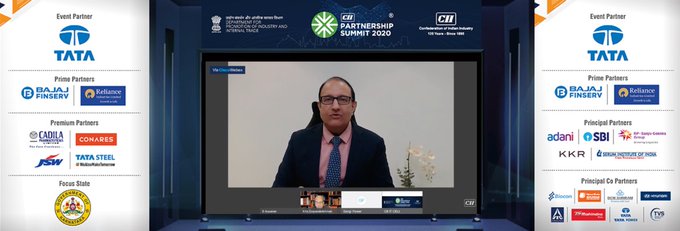“Trade Agreements need to be brought under the Digital Era – Minister of Trade Relations, Singapore
New Delhi: The current year was a “Digital Watershed”. The changes one thought would take several years to happen, had occurred in the short span of 6-9 months. This was stated by HE Mr S Iswaran, Minister for Communications and Information & Minister-in-charge of Trade Relations, Republic of Singapore during a conversation with Mr Kris Gopalakrishnan, Past President CII and Co-Founder, Infosys Limited and Chairman, Axilor Ventures Private Ltd. during the CII Partnership Summit 2020, organized by the Confederation of Indian Industry in collaboration with the Department of Promotion of Industry and Internal Trade.
Mr Iswaran further mentioned about the “Digital Economy Agreement” signed between Singapore and Australia. He said that it was important to bring the trade agreements into the digital era. “We need to understand the movement of bits and bytes and data along with goods, services and capital in our Trade Agreements, because if the economy was going through a digital transformation, then it should also be able to connect digitally with other economies around the world”, he added. Further, electronic facilitation of trade was a key component of the digital initiative. Digital transformation and internationalization of economies must be inclusive so that people do not feel disenfranchised.
He said that assuring personal data protection and security was one of the dominant themes of digital transformation. On the issue of cyber security, Mr Iswaran said that the Singapore Government was identifying critical information infrastructure in 11 economy verticals on the safeguards that were needed to ensure that risks were minimized on digital platforms. On the Personal Data Protection Act of Singapore, he said that the Act clearly spelt out the obligations of enterprises and yet provided certainty to businesses on use of data for legitimate purposes.
“Mr Iswaran said it was only on account of digitization that certain aspects of doing businesses such as the ability to enter foreign markets, collaboration overseas etc were no longer the sole preserve of large businesses. SMEs could also connect overseas and do businesses successfully.
He further said that Singapore had formulated a ‘Future Economy Council’ which worked on twenty-three industry verticals. Each of these verticals addressed not only issues of internationalization and commercialization but that also of jobs and skills development.. Emphasising that all citizens of the world had a joint stake in a shared future, he said “We are all globally integrated and no one was safe unless everyone was safe”.
Alluding to the issue of climate change and sustainable development, Mr Iswaran was of the view that no outcome would be sustainable and conducive to growth and prosperity unless the solutions were collaborative in nature.
Speaking on Singapore’s approach to handing the pandemic, Mr Iswaran said that the pandemic was treated not just as a healthcare issue but also something which needed an economic and a social intervention. Amongst the first steps taken by the Singapore Government to address the pandemic, was to create a WhatsApp channel which was used as a Government communication service to send out accurate and timely information on the pandemic and thereby reduce the scope for misinformation. “Further, testing, tracing and treatment were the key components of the Government approach to handle the situation even while calibrated and measured steps were taken towards opening up” he added.
Mr Gopalakrishnan said that the world had witnessed unprecedented collaboration in tackling the virus and developing the vaccine. He hoped that similar cooperation should be considered in overcoming other challenges such as climate change and promoting sustainable development.

